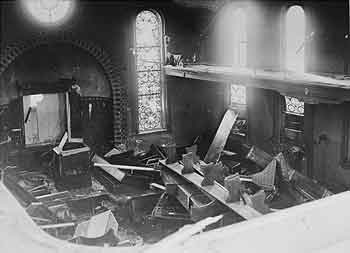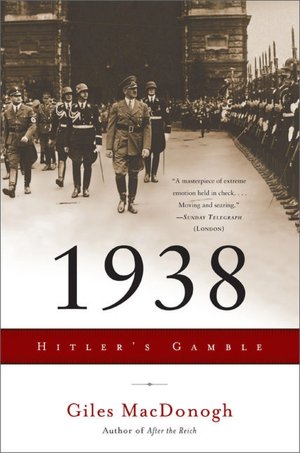I just read 1938: Hitler's Gamble by Giles MacDonogh. The book is quite short. While the author has published several other books, I found myself often having to reread sentences to understand their content; there were some howlers. The book would have been greatly improved by better footnotes, appropriate maps, and an annex with brief bios of at least the key characters mentioned in the narrative. There are so many people named that I found it very difficult to keep track. The book seems to be badly titled, since the emphasis seems to be more about the plight of the Jews in German speaking Europe than on the key decisions being made by the Nazis during 1938.
This book addresses German history during a critical year. In 1938, the Nazis consolidated Hitler's domination of the German government, eliminating the power of the other coalition members. It was the year of the Anschluss in which Austria was absorbed into Germany. It was also the year in which Germany absorbed the Sudetenland from Czechoslovakia and Chamberlain signed the Munich agreement acceding to that action.
The Nazis at the time were preparing for war, rebuilding the German military machine. The Nazi regime was exhausting the German economy by the expenditures on militarization, by its grandiose building program, and by its poor economic policies. The addition of Austria and the Sudetenland to Germany supplied foreign exchange, money, and men for the army.
Hitler is described as having a long term plan -- absorbing Austria, then the Sudetenland, continuing the expansion of the Third Reich, and preparing for a major war of expansion. He is further described as attracting true believers and (with the help of Goering's propaganda machine) effective in speaking to the public. He could find deputies effective in implementing his programs, was quick to change those who proved a problem, and ruthless in suppressing opposition. And of course, his program was crazy in that it led to his country losing a major war, his party being destroyed, and his own suicide.
MacDonough portrays Hitler as removing himself increasingly from the normal duties of a chief of government during the year, eventually sleeping till noon, spending his awake hours reading thrillers and watching films, stressing his interests and time spent on the arts. In MacDonough's treatment, Hitler provides the ideology for the Nazi movement and its public face, while a core of followers runs the government in his name.
 |
| View of the destroyed interior of the Hechingen synagogue the day after Kristallnacht. |
I sympathize greatly with the Jews in Germany in 1938. I suppose that most of the adults at that time understood that they were in grave danger of losing their property and being driven out of their homes and indeed what they perceived as their country. On the other hand, I suppose that few if any could imagine the horror of the holocaust to come. In 1938, they must have been desperate to leave Germany and to find somewhere to establish a new life. Many found a way to move to a new country, learn a new language, and take up new jobs and professions; many found themselves in concentration camps by the end of 1938, subject to terrible treatment (but not yet by the gas chambers); many more were unable to find a way out leaving them to await the Nazis' "final solution" during the war. The horror of the holocaust was still to come, but the plight of the Jews in 1838 was itself terrible.
I suppose the major import of the book is that:
- Thugs abound in countries even as cultured as Austria and Germany were in 1938, and if unleashed and encouraged by those in power, the thugs will terrorize those they hate. The Night of the Broken Glass in which thugs attacked and looted businesses and beat and killed Jews is the prototypical example of such a condition. As we have learned from other places and other times, genocide happens!
- It is possible for people with crazy policies to take over the government of a highly civilized, democratic government, consolidate their power, and in implementing those policies destroy the country itself. Think of the rubble that was left to the Germans surviving World War II!
- Such a nation with such a government can wreak huge damage on other nations. It is therefore appropriate for other nations to take preventive action. Britain, France, the USSR and the United States by opposing the Nazis might have enabled the German factions opposed to the Nazis to hold them in check. By opposing the Anschluss and the invasion of Czechoslovakia, they many have checked German expansionism.
MacDonogh does not make an important point, but many others have done so: the way that World War I was ended and the terms of the Treaty of Versailles were perhaps fundamental causes of the rise of Hitler and the Nazis and thus of World War II. Certainly the allied leaders at the end of World War II were determined to create new international institutions (the United Nations, the Breton Woods institutions) that would be more effective than the League of Nations in preventing future world wars. President Roosevelt insisted that World War II end with the unconditional surrender of the Axis powers. President Truman's administration took the unprecedented step of creating a Marshall Plan to rebuild the economies and political systems of the conquered nations, beginning their economic recovery and restoring them to the community of nations.

No comments:
Post a Comment